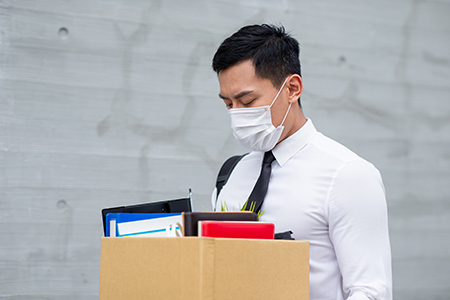Hundreds of employers with HR questions related to the coronavirus pandemic tuned into an NJBIA webinar with Archer Law attorneys to learn more about changes to unemployment benefits and a new federal paid leave law for workers that businesses must pay for now and get reimbursed for later.
Unemployment Law Changes
The federal Coronavirus Aid, Relief & Economic Recovery Act (CARES) increased and expanded unemployment insurance benefits available to workers who have lost their jobs, had their hours reduced, or are unable to work due to COVID-19, according to Peter Frattarelli, a partner at Archer Law. Under this change, jobless employees who normally receive 60% of their wages (for a maximum $713 per week in New Jersey) will have $600 added to their weekly unemployment benefits.
“Even if that puts the employee above 100% of their salary, they are going to get that ($600) supplement and it will be available for four months — April, May, June and July,” Frattarelli said.
The federal government will funnel the money to the states to pay for this, therefore, the $600 in supplemental benefits is not something that businesses have to foot the bill for directly. However, it is something business owners should consider if they are weighing the possibility of layoffs, Frattarelli said.
“If you’re concerned about laying people off, and the disadvantaged position it may put them in financially, the CARES Act is going to be a help,” Frattarelli said. “Most employees making below $70,000 or $75,000 on an annual basis are going to be made close to whole, or maybe even be above what their normal salary is, during that specific period of unemployment.”
Paid Sick Leave under Federal Families First Coronavirus Response Act
Another federal law with a more direct impact on a business’ cash flow is the Families First Coronavirus Response Act, which took effect April 1. A provision requires businesses with 500 or fewer employees to provide emergency paid sick leave or family leave for a variety of COVID-19-related reasons.
“The key is that you as an employer are going to have to put this (money) out, but you will be reimbursed either through a payroll tax offset or through a later refund,” Frattarelli said. “It’s more of a cash-flow issue since, obviously, you have to do this right now if someone needs to leave.”
There are several reasons employees can take a COVID-19 related leave and how much they are paid depends on the specific reason, Frattarelli said.
Employees can take emergency paid sick leave if: they are sick from COVID-19; have COVID-19 symptoms and are seeking a medical diagnosis; or have been exposed to the coronavirus and advised by a healthcare provider or government entity to self-isolate. If employees of open businesses are not able to work for one of those three reasons, they are required to be paid their full salary up to $511 per day, for a maximum of $5,100 maximum over the 10-day leave, Frattarelli said.
Employees of non-essential businesses that have been closed down by government order, however, are not entitled to that emergency paid sick leave benefit, Frattarelli said.
“There has been a lot of debate about this, but our advice is clear: If your business has been closed by government order, employees are not entitled to paid sick leave,” Frattarelli said. “If (employees) are not working, their remedy is unemployment insurance plus the $600 (federal government) supplement.”
The FFCRA law also allows employees to take an emergency paid leave if they are caring for someone who is quarantined due to COVID-19, or must stay home to take care of children whose schools or daycares are closed due to COVID-19 — but the amount they are paid is far less, Frattarelli said.
“It’s two-thirds of their salary up to $200 a day, so the most they could get is $2,000 over 10 days,” Frattarelli said.
Under a recent amendment to the federal Family Medical Leave Act, employees who are caregivers of children whose schools or daycares remain closed due to COVID-19 may extend that emergency leave up to 10 weeks. If the employer agrees, a worker can also take the leave intermittently – for example when two parents work and ask employers if they can alternate taking time off to care for the children.
Employers cannot deny a leave for COVID-19 childcare on the grounds that they believe the employee’s spouse should be the one caring for the child. “There is nothing in the law that allows an employer to say: ‘Hey, wait a minute, you have a spouse. He isn’t working or she isn’t working so why can’t they watch your child?’ That is not a permissible reason.”
Anti-Discrimination Laws & COVID-19
Attorney David Rapuano, another partner at Archer Law, said employers are also asking for guidance on asking COVID-19 medical-related questions of employees without running afoul of health privacy or anti-discrimination laws.
“You are allowed to ask employees if they are having symptoms of COVID-19 such as fevers, dry cough, things of that nature, but you’re not allowed to ask general disability questions outside the realm of COVID-19,” Rapuano said.
Because of the health threat that workers with COVID-19 pose to others in the workplace, employers are allowed to do temperature checks on employees, according to recent guidance from the U.S. Equal Employment Opportunity Commission, which enforces federal anti-discrimination laws.
“You are allowed to take temperatures as a precaution, but you would have to do it for everybody,” Rapuano said. “You couldn’t just single out one employee unless they’re having identifiable symptoms.”
Go here to hear the entire webinar.


